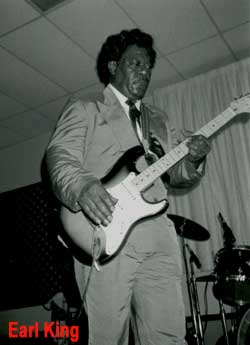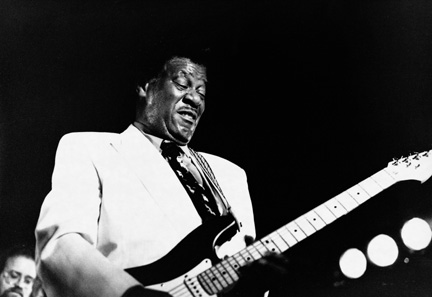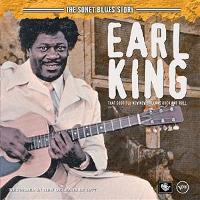Posts tagged Huey “Piano” Smith
Mardi Gras Music Series: EARL KING
0I’ve been a big fan of Earl King since moving to New Orleans in the middle 1970’s. I remember seeing Earl at the Jazz Fest in the late 1970’s. He was a true R&B powerhouse. I purchased a copy of the Trick Bag album, it was 1 of the top 5 New Orleans R & B tunes for me, along with Tell It Like It Is, Go To The Mardi Gras, Cha Dookie-Doo, and Mardi Gras Mambo.
Unilaterally respected around his Crescent City birthplace as both a performer and a songwriter, guitarist Earl King was a leading New Orleans R&B force for more than 4 decades.
Mardi Gras tune- Street Parade by Earl King
Born Earl Johnson, the youngster considered the catalogs of Texas guitarists T-Bone Walker and Gatemouth Brown almost as fascinating as the live performances of local luminaries Smiley Lewis and Tuts Washington. King met his major influence and mentor, Guitar Slim, at the Club Tiajuana, one of King’s favorite haunts (along with the Dew Drop, of course). The two instantly became friends. Still performing under the name Earl Johnson, the guitarist debuted on wax in 1953 on Savoy with “Have You Gone Crazy.” On this record, longtime pal Huey “Piano” Smith made the first of his many memorable supporting appearances.
In the world of the Blues the name of “King” is highly respected. Most fans associate the surname with the obvious “Big 3,” Albert, B.B. and Freddie. But in New Orleans, the residents know there is a 4th that deserves his place alongside these 3: Earl King.
Earl King was more than just a musician. He was a renaissance man. During his nearly 5 decade career, he wore many hats: guitarist, vocalist, songwriter, producer, sideman, arranger and mentor. He was prolific in his output, perhaps only rivaled by Allen Toussaint for recognizable material. His songs have been covered by the likes of Fats Domino, Jimi Hendrix, Stevie Ray Vaughan, The Meters, Johnny Adams, Professor Longhair and many more. And unlike many other artists of his generation, he profited from the royalties gained by those who covered his songs as he had wisely retained the copyrights to his work.
He was born in New Orleans as Earl Silas Johnson on February 6, 1934. Raised in the city’s Irish Channel neighborhood, his father was a Blues pianist who was a close acquaintance with the locally renowned Tuts Washington. But Earl’s father died when he was still quite young and he was raised in a single-parent home by his mother, a heavy-set woman known affectionately as “Big Chief.”
Earl’s musical life began in the family church. He participated in the choir singing Gospel. But one day while walking through the neighborhood he heard the guitar playing of Smiley Lewis emanating from a bar. The music enchanted him and he sought means to express his singing outside of the church.
Pianist Huey Smith heard the teenager sing and decided to hire him for his band. Needing another vocalist and musician, he convinced Earl to pick up the guitar.
Johnson became Earl King upon signing with Specialty the next year. Label head Art Rupe intended to name him King Earl, but the typesetter accidentally reversed the names. A Mother’s Love, King’s first Specialty offering, was an especially accurate Guitar Slim homage produced by Johnny Vincent, who would soon launch his own label, Ace Records, with King one of his principal artists. King’s first Ace single, the seminal two-chord south Louisiana blues Those Lonely, Lonely Nights, proved a national R&B hit (despite a sound-alike cover by Johnny “Guitar” Watson). Smith’s rolling piano undoubtedly helped make the track a hit.
I notice this Trick Bag album is on the Sonet label, that’s a Scandinavian label, I knew the owners, and did business with the Storyville label for many years. It was sold to Polygram and for a decade they buried the label.
King remained with Ace throughout the rest of the decade, recording an unbroken string of great New Orleans R&B sides with the unparalleled house band at Cosimo’s studio. He later moved to Imperial to work with producer Dave Bartholomew in 1960, cutting the classic Come On (also known as Let The Good Times Roll) and 1961’s humorous Trick Bag. He managed a second chart item in 1962 with Always a First Time. King wrote standout tunes for Fats Domino, Professor Longhair, and Lee Dorsey during the 1960s.
Although a potential 1963 pact with Motown was scuttled at the last moment, King admirably rode out the rough spots during the late ’60s and ’70s. In the 1990s, he rejuvenated his career by signing with Black Top; Sexual Telepathy and Hard River to Cross were both superlative albums.After releasing well over 100 albums, the label folded in 1999. Nauman Scott died in 2002. Hammond Scott sold the rights of the catalog, and some releases were reissued on labels such as Varèse Sarabande, Fuel 2000 and Shout! Factory. In 2006, P-Vine Records in Japan acquired the worldwide rights to them, and has reissued a few of the CD’s from the catalog.
In 2001, King was hospitalized for an illness during a tour to New Zealand, however, that did not stop him from performing. In December of the same year, he toured Japan, and he continued to perform off and on locally in New Orleans until his death.
He died on April 17, 2003, from diabetes related complications, just a week before the New Orleans Jazz & Heritage Festival. His funeral was held during the Festival period on April 30, and many musicians including Dr. John, Leo Nocentelli and Aaron Neville were in attendance.[4] His Imperial recordings, which have been long out-of-print, were reissued on CD soon after he died. The June 2003 issue of a local music magazine OffBeat paid a tribute to King by doing a series of special articles on him.


